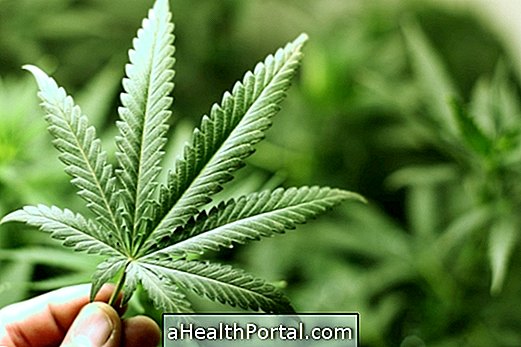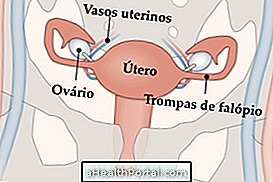Marijuana, also known as cannabis or marijuana, is a hallucinogenic type of drug that causes pleasant feelings at the time of its use, such as relaxation, retching, euphoria, and changes in the level of consciousness.
However, these effects occur at the expense of changes in the performance of various brain functions, interfering in thought, attention, concentration, memory, feelings, motor coordination and intellectual capacity, for example.
In addition, it has been observed that continued use of marijuana can also cause negative effects on other organs of the body, many of them lasting, even after discontinuation of use.

1. Effects on the brain
The active principle of marijuana, called tetrahydro-cannabidiol, binds to brain receptors causing interference in its functioning. The main side effects of its chronic use include:
- Difficulties of learning and memory;
- Apathy;
- Loss of motivation and productivity;
- Headache;
- Irritability;
- decreased motor coordination;
- Visual impairment.
In addition, emotional and psychiatric effects such as increased likelihood of anxiety, depression, panic attacks, suicide attempts and the development of schizophrenia can also be triggered.
2. Effects on the digestive system
The use of marijuana causes changes in the regulation of digestion, causing nausea, vomiting and abdominal pain, which can worsen with frequent use.

3. Effects on the respiratory system
At the time of use, marijuana may have a bronchial dilator effect by relaxing your muscles. However, smoke inhaled into the lungs contains irritants that can cause intense inflammation in the respiratory system. Some of the consequences are:
- Nasal congestion;
- Asthma worsened;
- Bronchitis;
- Frequent respiratory infections.
Marijuana users have coughs and throat coughs as well as cigarette smokers, and there are clues that may also increase the risk of developing emphysema or lung cancer.
4. Effects on the cardiovascular system
The use of marijuana causes changes in heart rate and blood pressure, which are usually transient. However, there is evidence that the chronic use of this drug increases the risk of developing cardiovascular diseases, such as heart attack, stroke and heart failure.
5. Effects on the reproductive system
Marijuana use increases the chances of infertility, both female and male, for the following reasons:
- Reduces testosterone levels;
- Decreased libido;
- Production of defective spermatozoa that can not reach the ovum;
- It affects the implantation capacity of the embryo in the uterus;
- Changes in the menstrual cycle.
This is probably because the reproductive organs have a high concentration of receptors of the active principle of marijuana, which causes interference in its functioning with the chronic and excessive use of the drug.

These side effects usually arise when the plant is used improperly, without advice from the doctor and in exaggerated amounts, and without being in the form of medicines. Find out more about when Caconha can be used as a Medicinal Marijuana Medicinal Plant.
One remedy that is made from marijuana is Canabidiol, a drug that has the therapeutic properties of marijuana but that does not have the addictive effect for the organism that the plant has.
In Brazil, it is not possible to buy medicines made from marijuana, due to lack of Anvisa approval, but these can be purchased in other countries that approve their use as United States, Canada, Uruguay and Israel.























